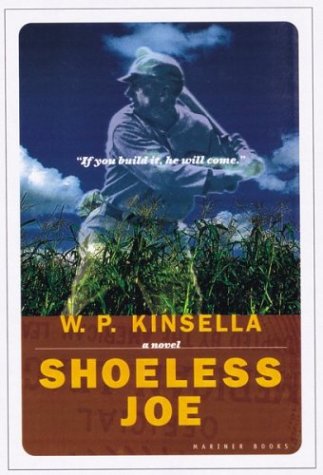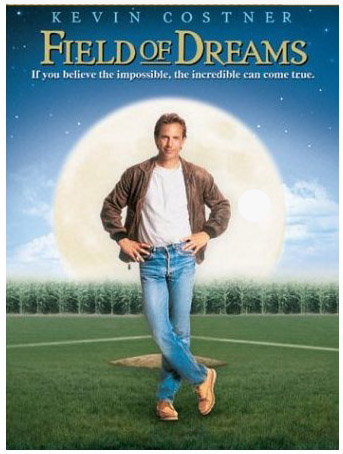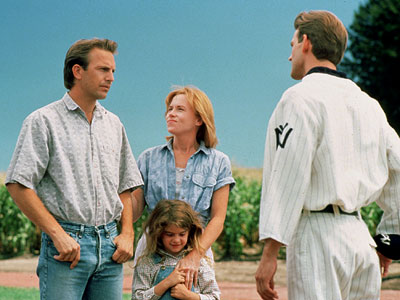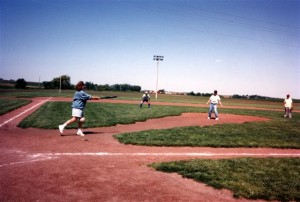It began as a short story by Canadian author W.P. Kinsella in an anthology of baseball stories titled, Shoeless Joe  Jackson Comes to Iowa. Later on, Kinsella expanded the story into a novel called, simply, Shoeless Joe. Most all of us know it as Field of Dreams, the 1989 movie starring Kevin Costner.
Jackson Comes to Iowa. Later on, Kinsella expanded the story into a novel called, simply, Shoeless Joe. Most all of us know it as Field of Dreams, the 1989 movie starring Kevin Costner.
The movie that, without even a close second, is my favorite movie of all time.
I never saw it in a theater. First time was on a VHS tape in the privacy of my living room. Probably for the better, because who wants to see a grown man bawling in public?
Most people know the story, a blend of baseball and magical realism. An Iowa farmer named Ray Kinsella hears a voice—actually, The Voice—in his cornfield say, “If you build it, he will come.” An image of a baseball field appears, and Ray figures that he has to build the field so that Shoeless Joe Jackson, his late father’s favorite ballplayer, can return and play baseball again. Sure enough, Ray builds the field, putting his family at financial risk, and Shoeless Joe’s ghost appears from what is left of Ray’s cornfield. Jackson was banned from  the game for life in the wake of the 1919 Black Sox Scandal, when eight members of the Chicago White Sox took bribes to throw the World Series. Soon others players have appeared, though it seems as if Ray and his family are the only ones who can see them.
the game for life in the wake of the 1919 Black Sox Scandal, when eight members of the Chicago White Sox took bribes to throw the World Series. Soon others players have appeared, though it seems as if Ray and his family are the only ones who can see them.
Following other cryptic messages from The Voice, Ray first tracks down Terrence Mann, a fictionalized version of J.D. Salinger. (In the novel W.P. Kinsella actually used Salinger as a character, but Salinger threatened a lawsuit, so the Catcher in the Rye author never made it to the screen.) Next, he finds Archibald “Moonlight” Graham, a Minnesota doctor who as a young man had played half an inning in a major league game and never got to bat. (Since the doctor is dead by this time, Ray has to travel back in time to speak to him.)
As Ray drives back to Iowa with Mann and a now youthful Archie Graham in tow, he talks about his fractured relationship with his late father. First, he started refusing to have a catch with his dad. Then, he left home for college at age seventeen after telling his dad that he could never respect anyone whose hero was a criminal—meaning Shoeless Joe. “The son-of-a-bitch died before I could take it back,” Ray tells Mann.
Back on the farm, everything comes together. Young Archie Graham has his wish fulfilled and bats in a major league game, then—as old Doc Graham—saves the life of Ray’s daughter before returning to the cornfield. With foreclosure on Ray’s doorstep, Terrence Mann (the awesome-voiced James Earl Jones) makes his impassioned plea, “People will come, Ray.” (Check out the clip.) Then, as the players return to the cornfield, Shoeless Joe indicates the catcher and tells Ray, “If you build it, HE will come.” The catcher is John Kinsella, Ray’s father, as a young man. The  shaken Ray talks to John, introduces him to his wife and daughter (pictured), and they talk some more. Then, as John gets ready to leave, Ray says, “Hey Dad, wanna have a catch?” The film ends with father and son throwing a baseball around on the field as James Horner’s magical score plays on and hundreds of cars approach the farm. People will indeed come, and they’ll pay good money to see the field, watch the ballplayers and recapture some of their youth.
shaken Ray talks to John, introduces him to his wife and daughter (pictured), and they talk some more. Then, as John gets ready to leave, Ray says, “Hey Dad, wanna have a catch?” The film ends with father and son throwing a baseball around on the field as James Horner’s magical score plays on and hundreds of cars approach the farm. People will indeed come, and they’ll pay good money to see the field, watch the ballplayers and recapture some of their youth.
I didn’t part on bad terms with my own dad, and having a catch with him was one of the joys of my childhood. In the summer of 1969, when I was twenty-three, we learned that he had terminal lung cancer. I lived in Ohio then, he and my mother in Brooklyn. In late August I saw him for the last time. We sat together and watched his beloved New York Mets beat some new team called the San Diego Padres. (The Padres have been my passion since the early ’70s.) A couple of weeks later, the Mets won a doubleheader to move into first place (they would win the World Series that year). My dad got so excited that, near the end of the first game, he had a heart attack and died. I guess if you have to go, you might as well do it pursuing your passion.
The night I watched Field of Dreams for the first time, not knowing exactly what to expect, I absolutely fell apart when Ray and his dad started throwing the ball around. As the credits rolled, Horner’s magic music played, and the cars started rolling into the farm, I couldn’t stop bawling. Even now, having seen the movie a gazillion times and knowing every line of dialogue in it, I’m still moved by that scene, and others.
If you follow this blog you might have read my first post ever, about second chances. If not, check it out. Field of Dreams is also all about second chances. Shoeless Joe Jackson gets a second chance to play ball. Terrence Mann is motivated to write again. “Moonlight” Graham has a second chance to bat in a major league game. And most important, Ray Kinsella gets a second chance at a relationship with his father. All in all a fun, entertaining, magical—and moving—experience. What more could you ask from any story?

That’s me pitching on the Field of Dreams.
The field, which still welcomes visitors, in located in Dyersville, Iowa. My wife’s family lives in Iowa, around Cedar Rapids, and on one of our many trips we visited the field (that’s me on the mound). Other people were there on a quiet weekday morning, and before long all of us were out on the field with bats, balls, and gloves, playing an impromptu game. It just—happened. Later on I walked the entire perimeter of the field, stopping for a moment near the corn, and I thought about my dad, and… Well, do I have to tell you?
SWORDS & SPECTERS: My long-lost sword & planet novel, The Master of Boranga (Ro-lan: Book One) is finally available on Amazon Kindle. More on that soon.

Beautiful post!
Thanks, BG.